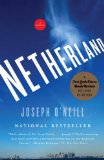Summary | Excerpt | Reading Guide | Reviews | Beyond the Book | Readalikes | Genres & Themes | Author Bio

A Novel
by Joseph O'NeillThe afternoon before I left London for New York—Rachel had flown out six weeks previously—I was in my cubicle at work, boxing up my possessions, when a senior vice-president at the bank, an Englishman in his fifties, came to wish me well. I was surprised; he worked in another part of the building and in another department, and we were known to each other only by sight. Nevertheless, he asked me in detail about where I intended to live (“Watts? Which block on Watts?”) and reminisced for several minutes about his loft on Wooster Street and his outings to the “original” Dean & DeLuca. He was doing nothing to hide his envy.
“We won’t be gone for very long,” I said, playing down my good fortune. That was, in fact, the plan, conceived by my wife: to drop in on New York City for a year or three and then come back.
“You say that now,” he said. “But New York’s a very hard place to leave. And once you do leave ...” The S.V.P., smiling, said, “I still miss it, and I left twelve years ago.”
It was my turn to smile—in part out of embarrassment, because he’d spoken with an American openness. “Well, we’ll see,” I said.
“Yes,” he said. “You will.”
His sureness irritated me, though principally he was pitiable—like one of those Petersburgians of yesteryear whose duties have washed him up on the wrong side of the Urals.
But it turns out he was right, in a way. Now that I, too, have left that city, I find it hard to rid myself of the feeling that life carries a taint of aftermath. This last-mentioned word, somebody once told me, refers literally to a second mowing of grass in the same season. You might say, if you’re the type prone to general observations, that New York City insists on memory’s repetitive mower—on the sort of purposeful postmortem that has the effect, so one is told and forlornly hopes, of cutting the grassy past to manageable proportions. For it keeps growing back, of course. None of this means that I wish I were back there now; and naturally I’d like to believe that my own retrospection is in some way more important than the old S.V.P.’s, which, when I was exposed to it, seemed to amount to not much more than a cheap longing. But there’s no such thing as a cheap longing, I’m tempted to conclude these days, not even if you’re sobbing over a cracked fingernail. Who knows what happened to that fellow over there? Who knows what lay behind his story about shopping for balsamic vinegar? He made it sound like an elixir, the poor bastard.
At any rate, for the first two years or so of my return to England, I did my best to look away from New York—where, after all, I’d been unhappy for the first time in my life. I didn’t go back there in person, and I didn’t wonder very often about what had become of a man named Chuck Ramkissoon, who’d been a friend during my final East Coast summer and had since, in the way of these things, become a transitory figure. Then, one evening in the spring of this year, 2006, Rachel and I are at home, in Highbury. She is absorbed by a story in the newspaper. I have already read it. It concerns a group of tribespeople that has emerged from the Amazon forest in Colombia. They are reportedly tired of the hard jungle life, although it’s noted they still like nothing better than to eat monkey, grilled and then boiled. A disturbing photograph of a boy gnawing at a blackened little skull illustrates this fact. The tribespeople have no idea of the existence of a host country named Colombia, and no idea, more hazardously, of diseases like the common cold or influenza, against which they have no natural defenses.
“Hello,” Rachel says, “your tribe has come to light.”
I’m still smiling when I answer the ringing phone. A New York Times reporter asks for Mr. van den Broek.
Excerpted from Netherland by Joseph O'Neill Copyright © 2008 by Joseph O'Neill. Excerpted by permission of Pantheon, a division of Random House, Inc. All rights reserved. No part of this excerpt may be reproduced or reprinted without permission in writing from the publisher.




When all think alike, no one thinks very much
Click Here to find out who said this, as well as discovering other famous literary quotes!
Your guide toexceptional books
BookBrowse seeks out and recommends the best in contemporary fiction and nonfiction—books that not only engage and entertain but also deepen our understanding of ourselves and the world around us.